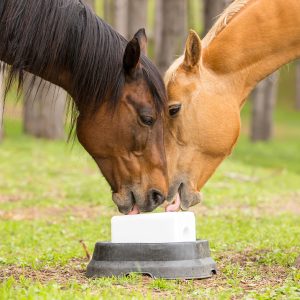
Why can’t I just feed salt as my source of electrolytes?
Electrolytes are a group of minerals that perform critical functions in the horse’s body. They are sodium (Na), potassium (K), chloride (Cl), and magnesium (Mg). Electrolytes help regulate nerve and muscle functions by carrying electrical impulses between cells. They also maintain fluid balance by stimulating the thirst response. When horses sweat they lose electrolytes, other minerals, and fluid. A lack of electrolytes in the proper ratios causes fatigue, muscle weakness, cramping, tying up, and thumps. It can also lead to life-threatening dehydration.
Salt is made up of sodium and chloride. It is missing the electrolytes potassium and magnesium. Magnesium is generally adequate in good quality legume hays, but lush pastures and grass hays can be deficient in magnesium. Most forages (hay and pasture) provide enough potassium but are insufficient in sodium and only marginal in chloride. Fortified feeds will also provide some electrolytes, but again not enough when the demand increases.
As you can see, it takes multiple feed sources to provide all the electrolytes in the proper ratios and even then, in some conditions a basic diet can’t replace lost electrolytes fast enough to keep up with the horse’s demand.
In conditions where a horse is at rest and not sweating much, they can meet their electrolyte requirements from a diet of good quality hay, a well-balanced vitamin and mineral supplement, and access to a plain white salt block. But once sweating increases, the horse can no longer replenish the electrolytes fast enough through a simple diet. Horses that are ridden regularly or those that live in hot, humid climates where they sweat daily need an electrolyte supplement. Horses that sweat during shipping or in any other stressful situation may lose more electrolytes than their bodies can replace, as well. In these situations, supplemental electrolytes should be provided.
We recommend Summer Games® Electrolyte. Summer Games was developed as a multipurpose electrolyte for use in all types of horses, from weekend warriors to highly competitive Olympic-level athletes. Because it is concentrated, it is easy to adjust the level of supplementation to meet each horse’s individual needs. Summer Games is unique because it closely mimics the composition of equine sweat. It not only replaces the essential electrolytes in the proper ratios, it also replaces other minerals lost during sweating.
Summer Games can be used daily, year-round. In the winter, ½ to 1 ounce per day can be fed to stimulate drinking during cold weather. Anytime of the year that horses are being ridden, the amount of supplementation will depend on the level of work and the intensity of the heat and humidity the horse is working in. Because of its concentrated formula, it is easy to adjust the level of Summer Games Electrolyte supplementation to meet your horse’s individual needs.
Below are some handy charts that will help you to estimate your horse’s workload and level of supplementation. Using this chart makes it easy for you to determine how much Summer Games your horse needs.
Guidelines for determining workload level
Light Work: Visible Sweat (up to 5 liters sweat loss) For example: dressage, western and English pleasure, trail horses, equitation, etc.
Moderate Work: Dripping Sweat (5-10 liters sweat loss) For example: jumping horses, racehorses, barrel racing, cutting, roping, etc.
Heavy Work: Dripping Sweat for Extended Periods (more than 10 liters sweat loss) For example: upper level three-day event, western performance horses, polo ponies
Amount needed to replace electrolytes
| Level of work | Normal Environment (oz/day) | Hot, Humid Environment (oz/day) |
| Rest | 0 | 1 |
| Light Work | 1 | 1-2 |
| Moderate Work | 2 | 2-3 |
| Heavy Work | 3 | 3-4 |
Always take temperature and humidity levels into consideration when supplementing with an electrolyte. Horses will sweat more in hot, humid climates. When it is very dry or cold, sweat may evaporate quickly and be less noticeable.
Always provide free-choice water to a horse that is getting electrolytes.


